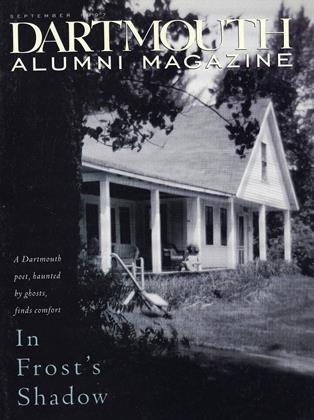When we caught up with Frank Gilroy '5O recently, he was in the midst of enjoying a very big week in the Very Big Apple. "I thought The Times was gonna ignore me the rest of my life!" he told us as we sipped cocktails at the Plaza. The tinkling of ice in tall glasses, the buzz of conversation, and the vaguely Venetian strains of a late-afternoon piano-and-violin duo made for interesting background music as Gilroy added, "But I guess I was wrong."
Wrong in spades. The Times not only had not ignored Gilroy this time, it raved about Getting In, his latest offering. Perhaps not since the opening of Gilroy's signature work, the Pulitzer Prize-winning The Subject Was Roseswsy back in 1962 had the great, gray cultural arbiter sung with such loud huzzahs for a Gilroy play. " Gettingln is an endearing oneact play about an army veteran from the Bronx who improbably sets his sights on Dartmouth after coming home from World War II," wrote Peter Marks in his review. "But the play can also be seen as the portrait of a generation, raised during the Depression, energized by the conviction that they might share in the abundance of an increasingly fluid and tolerant society."
And thus started Frank's excellent week. "People have been calling I haven't heard from in years," he said, relishing the moment." The Times has power in this town. It's still exciting, when something like, this happens."
It happened early on and thunderously for Gilroy with Roses and then happened more quietly, when it did, in the intervening years. He spent some time teaching drama at Yale, some time scripting and script-doctoring on the West Coast, a lot of time crafting an oeuvre that has, by now, grown to include five plays on Broadway and a dozen films. Getting In is a rare one-acter. As Marks mentioned, it's about Dartmouth, and we would be simply too coy if we didn't point out, with pride, that the play originally appeared in this magazine, back in May. It went from our pages to New York and to instant acclaim.
And now, whither? Could be: wither. "It goes nowhere!" said Gilroy, in defiant good humor. "It's a oneact. There's nowhere for oneacts to go!"
That seems a true pity, for we went with Gilroy to the theater that evening and saw the play which was, indeed, energetic, funny, moving, and altogether terrific. Every seat was filled The Timeshas power in this town and two of them were filled by Gilroy offspring, John, one of the twins who were members of Dartmouth's class of '81 (the other is Daniel), and the twins' elder brother Tony, introduced to us by dad as "the one they wouldn't let in!" (Dad was ebullient that night; Tony smiled indulgently.)
After the performance, we bumped into the brothers Gilroy on the sidewalk. We wondered just how autobiographical the play was. It certainly seemed to be, and they helped us. "Absolutely autobiographical," saidjohn. "Sitting around our living room, we've heard those stories a thousand times."
"That actor obviously talked to Dad," said Tony. "He got him right. He really captured his deranged optimism." Not so deranged, perhaps. For the innate and unquenchable Gilroy optimism got him to Dartmouth, got him out, got him that first big success and now, lo these years later, got him another vibrant blush of recognition and acclaim. The ever-optimistic Frank Gilroy has kept right on writing it's what writers do and once more he's the talk of the town.
Dodec the halls! Dartmouth's coed a capella group brings eclectic music to the green.
"Professor Jensen? They said you might be able to help me." Gilroy's protagonist, played by Thomas McHugh, fast talks his way into Dartmouth.
 View Full Issue
View Full Issue
More From This Issue
-
 Cover Story
Cover StoryIn Frost's Shadow
September 1997 By CLEOPATRA MATHIS -
 Feature
FeatureThe Tightrope
September 1997 By Dan Fagin '85 -
 Feature
FeatureUninight
September 1997 By DOUGALD MACDONALD '82 -
 Feature
FeatureThe Cult of Domesticity
September 1997 By Christine Altieri -
 Article
ArticleRoad Trip
September 1997 By Sarah Moore -
 Article
ArticleElevator Going Up, AstroTurf Going Down
September 1997 By "E. Wheelock."
ROBERT SULLIVAN '75
-
 Sports
SportsAt the Winter Games
April 1980 By Robert Sullivan '75 -
 Article
ArticlePosthu-Mously, Norman Maclean Takes On a New Element
February 1993 By Robert Sullivan '75 -
 Feature
FeaturePeter Smith's Tribal Links
Novembr 1995 By Robert Sullivan '75 -
 Cover Story
Cover StoryThe Witness
JUNE 2000 By ROBERT SULLIVAN '75 -
 Feature
FeatureThe New New York
Jan/Feb 2002 By ROBERT SULLIVAN '75 -
 Cover Story
Cover StoryStar Gazing
July/Aug 2003 By ROBERT SULLIVAN '75








